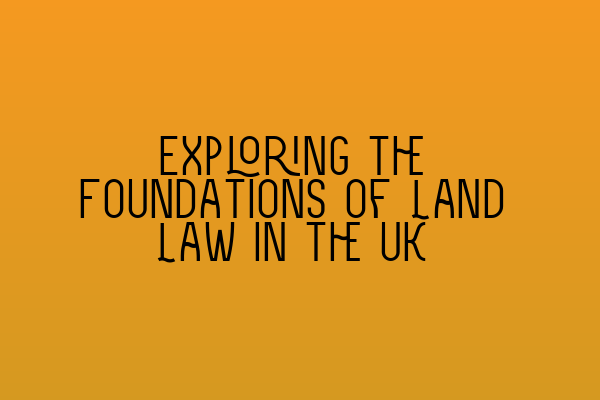Exploring the Foundations of Land Law in the UK
Welcome to the blog of SQE Property Law & Land Law. In this article, we will delve into the foundations of land law in the UK, providing you with an overview of the key concepts and principles that govern this area of law. Whether you are a law student preparing for the SQE 1 Practice Exam Questions or a professional seeking to expand your knowledge, this article will serve as an excellent resource.
The Concept of Land
Before we dive into the intricacies of land law, it’s important to understand the concept of land itself. In legal terms, land encompasses not just the physical soil, but also everything attached to or beneath the surface, such as buildings, trees, minerals, and water sources. It is a valuable and tangible asset with certain rights and interests associated with it.
Land law plays a crucial role in governing the rights, obligations, and transactions related to land. This includes issues such as property ownership, leases, mortgages, and easements. Understanding land law is essential for anyone involved in property transactions, whether it be buying or selling real estate, developing land, or resolving disputes.
Principles of Land Law
There are several fundamental principles that underpin land law in the UK. These principles provide the foundation for interpreting and applying the law in various situations. Let’s explore some of the key principles:
1. Registered and Unregistered Land
In the UK, land can be registered or unregistered. Registered land is recorded in the Land Registry, providing an official record of ownership and any third-party interests. Unregistered land, on the other hand, does not have an official record, and ownership is established through other evidence, such as deeds and historical documents. Dealing with registered and unregistered land can involve different legal processes and requirements.
2. Freehold and Leasehold
Ownership of land can be either freehold or leasehold. Freehold ownership grants the owner full and absolute rights over the land, with no time restrictions. Leasehold ownership, on the other hand, involves a lease agreement where the owner grants someone else (the leaseholder) the right to occupy and use the land for a specific period of time. Understanding the differences between freehold and leasehold is vital when advising clients on property transactions.
3. Property Rights and Interests
Land law recognizes various rights and interests that can exist in relation to land. These include easements, which are rights over someone else’s land, such as a right of way or a right to use a water source. Covenants, which are legally binding agreements affecting the use or development of land, are another important aspect of property rights. Additionally, mortgages and leases are common interests that can be held in relation to land.
Land Law and the SQE Exams
For aspiring solicitors, having a solid understanding of land law is crucial for success in the SQE exams. The SQE 2 Preparation Courses offered by SQE Property Law & Land Law are specifically designed to help candidates navigate the complexities of land law and other related areas.
Preparing for the SQE 1 Preparation Courses is also essential, as it covers the knowledge and skills required for practice in various areas of law, including property law. Taking SQE 1 Practice Mocks FLK1 FLK2 can significantly improve your chances of passing the exams and advancing your legal career.
Stay updated with the latest SRA SQE Exam Dates to ensure you can plan your studies effectively and register for the exams on time.
Conclusion
Land law is a complex and multifaceted area of legal practice. Understanding the foundations and principles of land law is crucial for anyone involved in property transactions or aspiring to become a solicitor. By grasping the concepts of registered and unregistered land, freehold and leasehold ownership, and property rights and interests, you will be well on your way to becoming a proficient property lawyer.
If you are preparing for the SQE exams, SQE Property Law & Land Law offers comprehensive courses and resources to help you succeed. Don’t miss out on the opportunity to enhance your knowledge and boost your chances of passing the exams with flying colors.
For more information, visit https://fqps.co.uk/sqe/property-law.
